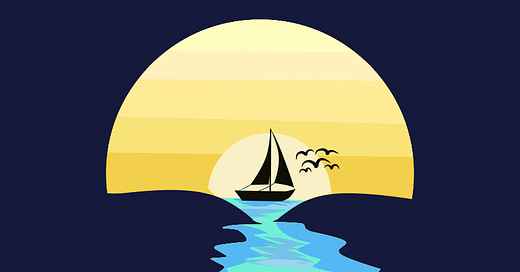Love Island and the 100,000
Among the many strange quarantine hobbies I picked up was watching the British reality TV show Love Island. On the show, a group of above-average-looking single people are cocooned in a villa in Mallorca for five weeks with the supposed goal of pairing off and finding love. The show offers many pleasures: the slapdash editing; the increasingly humiliating challenges the contestants are put through; the ability to delude yourself into thinking that the show’s Britishness somehow makes watching it “cultural.” But the best part of Love Island is that, despite being a trashy reality TV game show, it makes me believe in the possibilities of true love.
Each season, I’m amazed at how many of the participants seem primarily motivated not by the £50,000 first-place prize, or by a shot at mid-level influencer fame, but by a genuine desire to find love. And each season, I’m amazed at how many of them actually do. The construct of Love Island may be highly artificial, but the feelings it engenders are clearly real. The show is the purest distillation of a principle also found at summer camps, within college campuses, and on Birthright trips: bring a small group of decent-looking people together in a contained space and force them to spend time with each other, and inevitably some percentage of them will fall in love.
Like most intellectuals, I long ago lost any belief I might have had in the idea of “the one”—it was a concept I had jettisoned by the time I was 12 or 13, along with my Pokémon fandom and belief in God. But what Love Island so succinctly demonstrates is that the pool of people any of us could be capable of falling in love with is effectively infinite. Not only is there no “the one,” there’s not even the one thousand.
I have twice had the experience of falling in love within small, self-contained groups: once in high school, where my class had around 250 girls, and once as a camp counselor alongside just a dozen or so women my age. Splitting the difference implies that, in the right context, I could fall in love with at least 0.76% of the women I meet. (A conservative estimate, no doubt, since between the ages of 14 and 22 I’m pretty sure I could have easily fallen in love with almost every girl I knew.)
There are roughly 135 million female English speakers worldwide between the ages of 25 and 35, meaning even accounting for the decent chunk who aren’t interested in men, there are well over one million theoretical loves of my life out there. Roughly 135,000 of them live in the U.S. Hell, there should be over 8,000 in New York alone.
This is the great paradox of romance: statistically, it should be easy to find. Over and over, I watch groups of fame-hungry Brits with poor relationship skills slip into it effortlessly, within the structures of a TV show specifically designed to cause drama and emotional conflict. But as the pantheon of self-help books, dating apps, and back issues of this newsletter indicate, for most people, finding love doesn’t feel easy at all.
Now for the part where I go back on everything I just said.
For all that the thousands of words I’ve written on this topic might seem to imply otherwise, I actually don’t think it’s love that’s hard to find at all. Love is easy, because love is just an emotion—take the right drugs at the right party and you can pretty much feel it on-demand. When we complain about the difficulty of finding love, I think we’re usually talking about something else, something more practical: call it compatibility, or commitment, or partnership. Finding someone you could fall in love with is easy. But finding someone you could build a life with is hard.
It’s so easy to fall in love in a contained environment like summer camp or Love Island not just because our options are narrowed down, but because the practicalities of life are swept away. Of course loving someone is effortless when you don’t have to think about the real world. There may be 8,000 women I could fall in love with in New York, but I’d have to fall in love with them in New York, where they’d come with an entire life attached to them.
Maybe the lesson is that we should stop thinking of what we’re looking for as “love.” Or maybe it’s that we should try to find—or create—more of those kinds of contained spaces.
But none of it means I’m not comforted by that 8,000 number, as suspect as the math behind it may be. Reminding myself that, statistically, a lot of my dates should be working out can help me look for the ways in which they might. And even if someone doesn’t seem all that right for me in the moment, it can be helpful to remember that, in the right context, we could easily find our way towards falling in love.
Like, for example, if we were both on Love Island.
Yours in worrying that this newsletter might stop being as good if I start seriously dating someone,
Max
Ruin an enemy’s day by forwarding this to someone you know will hate it:




